NEWSLETTER 6th January 2021
Belated Christmas Greetings and best wishes for the New Year to all our members.
Our limited 2021 programme is set out below, but please note that some of the talks are provisional, as covid restrictions may affect speakers’ availability or the viability of their presentations.
AS THE VILLAGE HALL REMAINS UNAVAILABLE THE TALK ON JANUARY 15th WILL TAKE PLACE AS AN EXCLUSIVELY ZOOM PRESENTATION. OUR CONTINUING APOLOGIES TO OUR MEMBERS WHO DO NOT HAVE ACCESS TO THIS SERVICE
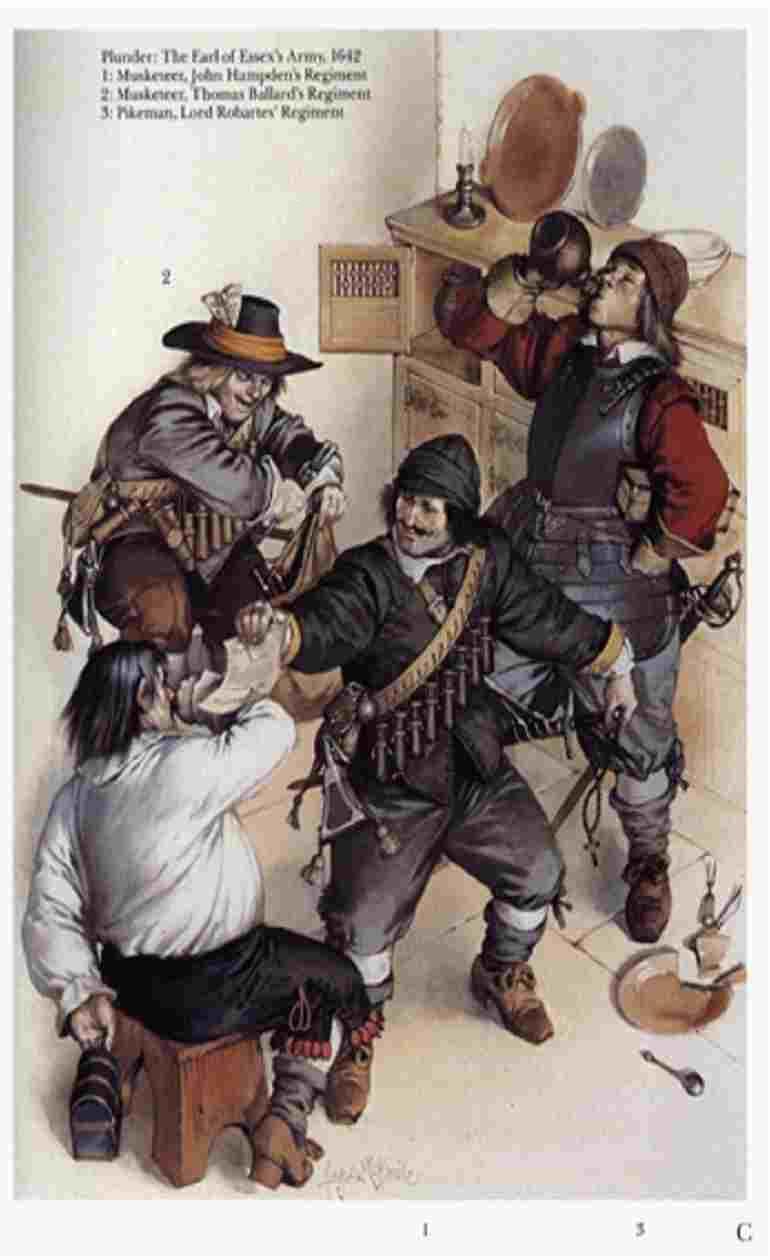 The 15th January meeting will take place as scheduled but unfortunately exclusively as a Zoom meeting via the internet. We will send you an email on Thursday 14th with the Zoom invitation to join the Friday meeting, starting at 7.15pm. The speaker is our founder member David Beaumont, who will describe the background to the 17th-century civil wars and illustrate his work transcribing local claims for compensation following the end of the wars. His work contributes to an ambitious county-wide project initiated by Dr Maureen Harris with the support of the Friends of the Warwickshire County Record Office. The project’s aim is to transcribe the original claims made by each Warwickshire parish, using local volunteers, who have been initiated into the mysteries of 17th century handwriting through seminars and regular contact with Maureen and the WCRO. Those with experience of such scripts were specifically discouraged from taking part, as one of the objects was to encourage new researchers to this field. David was one of our members who bravely set out to decipher the documents for Kineton and neighbouring parishes. The edited transcriptions are due to be published with an analysis by Maureen in due course. In the meantime David will give us a preview of what some Kineton residents claimed they had lost during the chaotic years of the Civil Wars.
The 15th January meeting will take place as scheduled but unfortunately exclusively as a Zoom meeting via the internet. We will send you an email on Thursday 14th with the Zoom invitation to join the Friday meeting, starting at 7.15pm. The speaker is our founder member David Beaumont, who will describe the background to the 17th-century civil wars and illustrate his work transcribing local claims for compensation following the end of the wars. His work contributes to an ambitious county-wide project initiated by Dr Maureen Harris with the support of the Friends of the Warwickshire County Record Office. The project’s aim is to transcribe the original claims made by each Warwickshire parish, using local volunteers, who have been initiated into the mysteries of 17th century handwriting through seminars and regular contact with Maureen and the WCRO. Those with experience of such scripts were specifically discouraged from taking part, as one of the objects was to encourage new researchers to this field. David was one of our members who bravely set out to decipher the documents for Kineton and neighbouring parishes. The edited transcriptions are due to be published with an analysis by Maureen in due course. In the meantime David will give us a preview of what some Kineton residents claimed they had lost during the chaotic years of the Civil Wars.
Review of November and December 20 meetings.
Our scheduled speaker for November was unable to deliver their 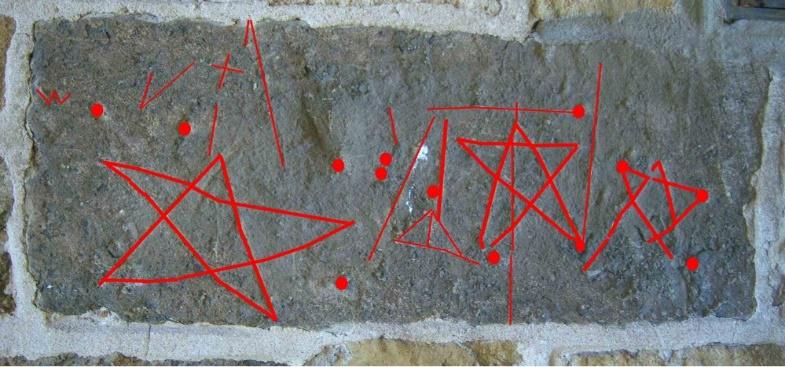 talk, and at short notice your Chairman filled in. The simple Zoom arrangement, where the Host (me) and the Speaker (me!) were the same, seemed to work and we hope that future Zoom talks will continue to run as smoothly. The title Graffiti in Local Churches: devotion or desecration? turned out to be too simplistic, as the variety of marks in churches are often both devotional and scurrilous and much more besides. It is clear that although many of these vernacular inscriptions survive in pre-Victorian churches, many have also been lost to some vigorous cleaning and refurbishment regimes. As an archaeologist, the speaker is well acquainted with the problems posed by incomplete material, and so any conclusions, especially those based on where surviving graffiti are found, have to be cautious ones. That said, some locations do seem to have attracted graffiti makers, – eg the porch, chancel and tower arches, aisle pillars, and door and window surrounds, whereas blank walls, the favoured canvas of the contemporary graffiti artist, were largely ignored. Mystery still surrounds the meanings and motives of much church graffiti, and there is a growing research interest in documenting and recording it.
talk, and at short notice your Chairman filled in. The simple Zoom arrangement, where the Host (me) and the Speaker (me!) were the same, seemed to work and we hope that future Zoom talks will continue to run as smoothly. The title Graffiti in Local Churches: devotion or desecration? turned out to be too simplistic, as the variety of marks in churches are often both devotional and scurrilous and much more besides. It is clear that although many of these vernacular inscriptions survive in pre-Victorian churches, many have also been lost to some vigorous cleaning and refurbishment regimes. As an archaeologist, the speaker is well acquainted with the problems posed by incomplete material, and so any conclusions, especially those based on where surviving graffiti are found, have to be cautious ones. That said, some locations do seem to have attracted graffiti makers, – eg the porch, chancel and tower arches, aisle pillars, and door and window surrounds, whereas blank walls, the favoured canvas of the contemporary graffiti artist, were largely ignored. Mystery still surrounds the meanings and motives of much church graffiti, and there is a growing research interest in documenting and recording it.
Report on Christmas meeting..
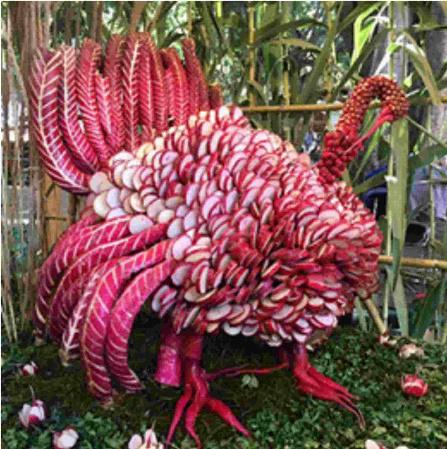 With the Village Hall still unavailable for our traditional December mince pies and mulled wine meeting your committee appealed to members to present short memorable personal recollections of Christmas via Zoom. Thank you so much to the dozen who informed and entertained us with their stories, and to the 25 participants who supped festive drinks and joined the meeting from their homes. Claire Roberts kicked off with an account of an exotic pre-Christmas festival in Oaxaca, Mexico, where oversized radishes are carved into intricate designs. Her photos of turkeys and entire Nativity scenes fashioned from radishes were extraordinary. As was her account of being warmly included in a family party, attended by accident – a welcome reminder of the kindness of strangers.
With the Village Hall still unavailable for our traditional December mince pies and mulled wine meeting your committee appealed to members to present short memorable personal recollections of Christmas via Zoom. Thank you so much to the dozen who informed and entertained us with their stories, and to the 25 participants who supped festive drinks and joined the meeting from their homes. Claire Roberts kicked off with an account of an exotic pre-Christmas festival in Oaxaca, Mexico, where oversized radishes are carved into intricate designs. Her photos of turkeys and entire Nativity scenes fashioned from radishes were extraordinary. As was her account of being warmly included in a family party, attended by accident – a welcome reminder of the kindness of strangers.
Steve Gale recounted how he, personally, switched off Christmas day 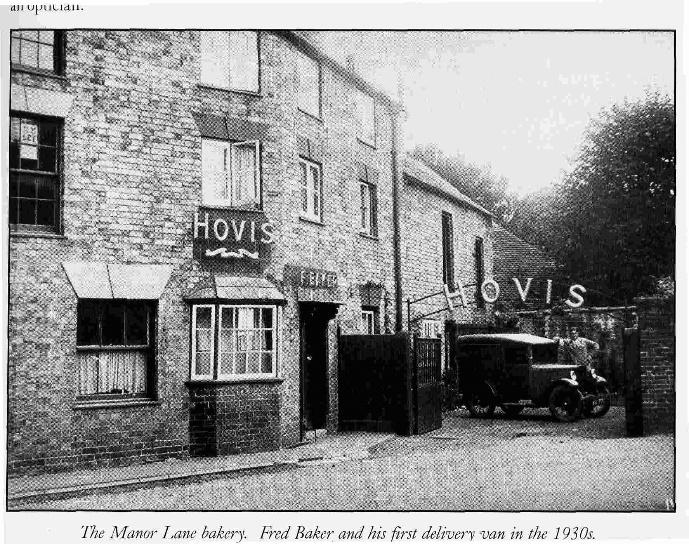 BBC1 transmissions to the Orkneys, and then had to endure a very rough ferry crossing from Scrabster to Stromness (and back) to sort it out, apparently by flicking a reset button. Jane Waters described how her family of bakers in Sevenoaks produced elaborately iced three-tiered cakes for the local gentry. Tiers mean something a little less festive nowadays. Jane’s mother, born in 1912, could remember villagers bringing their Christmas turkeys to be cooked in the baking ovens on their way to church, and picking them up on the way home. The same was happening in Kineton at Fred Baker’s bakery at the top of Manor Lane.
BBC1 transmissions to the Orkneys, and then had to endure a very rough ferry crossing from Scrabster to Stromness (and back) to sort it out, apparently by flicking a reset button. Jane Waters described how her family of bakers in Sevenoaks produced elaborately iced three-tiered cakes for the local gentry. Tiers mean something a little less festive nowadays. Jane’s mother, born in 1912, could remember villagers bringing their Christmas turkeys to be cooked in the baking ovens on their way to church, and picking them up on the way home. The same was happening in Kineton at Fred Baker’s bakery at the top of Manor Lane.
Anitra Hall sent a letter with news of fresh disasters which I, as host, presented to the group, picking out Anitra’s varied talents and her regret at not being able to defend her cup for winning the folk singing category at Leamington Spa Competitive Music Festival, a casualty of lockdown.
Ilona followed with stories of more performances, this time during Christmases at the Blackpool boarding house run by her parents Olive and Alec. Channelling her mother, she recounted how neighbouring guest-houses passed Christmas entertainers along the street, the performers being plied with drink at each venue. Ilona remembered a magician objecting to the mirror he was obliged to stand in front of until she and Olive stood holding up a sheet to obscure it. Ilona remains sceptical of conjurors to this day. A well-oiled singer, having previously provided pianist Ilona with his music, launched out in a different key and tempo, reminding one of a well-known Eric and Ernie sketch featuring Andrew Preview.
Kneale Johnson was not able to provide a precise location for his Christmas story, because as a five-year old he was in transit to the Middle East via the Cape. His Christmas present he does know however. It was a Hornby O-gauge clockwork railway set which just fitted into the cabin. The captain and crew seem to have enjoyed it as much as Kneale.
Gill Ashley-Smith recollected idyllic childhood Christmases in Norwich, with feather beds and children’s stories, with delightful Boxing Day teas presided over by “Aunts” Gwen and Connie in their Victorian villa. Bread and butter featured strongly.
Peter Waters described the traditional Christmas proceedings in Shoreham (not by sea), much loved by Samuel Palmer and William Blake. The real father Christmas distributed presents prior to a Christingle service, and a visit to see Samuel Palmer’s house.
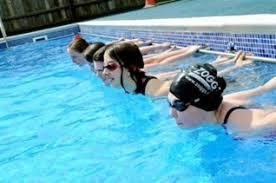 Closer to home Pam Redgrave revealed a history of swimming instruction, life saving and swimming pool construction. Forty years ago she helped build the High School swimming pool, a pioneer solar heated facility. On Christmas day morning 1980 she was one of a party invited to swim in the newly completed pool by the retiring headmaster, Mr Turner. She managed 40 lengths in an hour.
Closer to home Pam Redgrave revealed a history of swimming instruction, life saving and swimming pool construction. Forty years ago she helped build the High School swimming pool, a pioneer solar heated facility. On Christmas day morning 1980 she was one of a party invited to swim in the newly completed pool by the retiring headmaster, Mr Turner. She managed 40 lengths in an hour.
Ted Crofts’ story was worthy of a TV sitcom. When he was in charge  of catering and entertainments at an Oxford hotel the pre-booked Father Christmas met with an accident before he was due to entertain a party of 30 children aged 3 to 10 years old on Christmas day. Ted was pressed into service but had to squeeze into a borrowed costume, too small for him, obtained after many panic phone calls. Presents appropriate to each child’s age had been wrapped and name tagged but several children had the same name, so Ted had to rely on his elf assistant, who had bought the presents, to advise him which ones to give to whom. Opportunities for disaster were many, but luck was on Ted’s side. I hope he got a bonus.
of catering and entertainments at an Oxford hotel the pre-booked Father Christmas met with an accident before he was due to entertain a party of 30 children aged 3 to 10 years old on Christmas day. Ted was pressed into service but had to squeeze into a borrowed costume, too small for him, obtained after many panic phone calls. Presents appropriate to each child’s age had been wrapped and name tagged but several children had the same name, so Ted had to rely on his elf assistant, who had bought the presents, to advise him which ones to give to whom. Opportunities for disaster were many, but luck was on Ted’s side. I hope he got a bonus.
With Ruth Morgan’s tale we were in exotic country again, in Kenya, with another near disaster. At Christmas at their mission it was the tradition for the local tribespeople to don their war dress and weapons and dance in celebration. A newly arrived couple unaware of the benign nature of this performance were badly shocked, and an international incident was only narrowly avoided.
Your host then rounded off the presentations with his recollections of working as a schoolboy in a ramshackle Bristol toy factory surrounded by foul-mouthed women who randomly sabotaged the machinery to give them time for a fag. One day a drum of Teepol (neat detergent) used to make bubble mixture got tipped over in the yard and a misguided attempted to wash it away with a hose generated drifts of foam which escaped out of the yard across the suburban road outside like a fog bank into which the traffic plunged. All in all an education to an innocent middle class lad.
Bob Briggs sent a contribution which the Post Office delayed by 2 weeks ensuring that it arrived too late for inclusion on the evening. He recounts the experience of winters in Montreal during a five-year teaching stint in the ‘60s. He describes skiing, snowball fights with Americans (with the English demonstrating the advantage of the cricket bowling action over baseball throws), creating his own ice rink by chucking buckets of water on the ground, the Canadians dancing the twist on tables, reputedly to improve their skiing, and the beauty of the Laurentian Mountains. Not so exhilarating apparently is changing flat tyres in temperatures of minus 40 degrees, which happens to be the same in both Fahrenheit and Centigrade.
Thanks again to all these contributors for bringing us all some cheery recollections of happier times.
2021 Programme
Until further notice our programme will be delivered via Zoom. The meetings will be
January 15 David Beaumont: The Civil War Claims Project: Kineton and District.
February 19 Professor John Hunter: The Making of Tysoe Project: the story so far.
March 19 AGM (format subject to covid rules)
April 11 Colin Clay and Phil Taylor: Back Tracks: detecting the past
May 21 Michael Luntley: From This Ground: songs and stories from 19thcentury agricultural workers (a performance, so subject to covid restrictions being lifted)
June, July August Summer outings to Moreton Morrell College, Stoneleigh Village, and Croome Park, arrangements to be to be confirmed
September 17 Peter Coulls and Alan Jennings: Warwick and Leamington Tramways
Oct 15 tbc
November 19 tbc
December 10 Christmas treats/ Christmas speaker
Other Matters
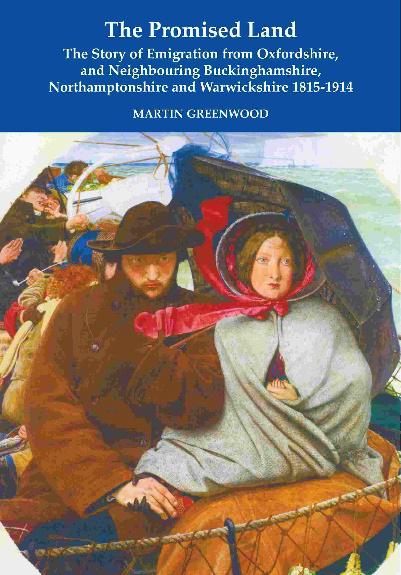 Local historian Martin Greenwood has informed us of his new book called ‘The Promised Land, The Story of Emigration from Oxfordshire and Neighbouring Buckinghamshire, Northamptonshire and Warwickshire 1815-1914. It covers Oxon mainly but there is plenty about its neighbours and the whole process of emigration, including the port of Liverpool, cost, shipping, passages, disasters, epidemic diseases and the experience of some after arrival, particularly in Australia.
Local historian Martin Greenwood has informed us of his new book called ‘The Promised Land, The Story of Emigration from Oxfordshire and Neighbouring Buckinghamshire, Northamptonshire and Warwickshire 1815-1914. It covers Oxon mainly but there is plenty about its neighbours and the whole process of emigration, including the port of Liverpool, cost, shipping, passages, disasters, epidemic diseases and the experience of some after arrival, particularly in Australia.
The blurb goes on to say: The author has written a lively and knowledgeable story of emigration from Oxfordshire and its neighbouring shires from 1815 to 1914. The story begins with the voyages of Captain Cook, which led to the provision of new places for penal colonies in Australia. Free emigration also gathered steam in the 1830s, followed by the Great Exodus from 1850. The story evokes the bustle and confusion of migrants at Liverpool, and the emotions of departure. It looks at their shipping, health problems, costs and shipwrecks, and at their experience on arrival. It also examines the political changes, particularly to the Poor Laws and Corn Laws.
Martin Greenwood has written previously about village life in Flora Thompson’s Lark Rise Country and more widely in Banburyshire. His most recent book was The Real Candleford Green, The Story of a Lark Rise Village, and he both gave a talk to the Group on this subject and led a village walk round Flora Thompson country for us some years ago.
The book is available from Martin for £9.95 plus p&p £3 = £12.95, with a cheque payable to Martin Greenwood, posted to him at “Sarnen”, Main Street, Fringford, Bicester, OX27 8DP
Other Society News
Other societies are exploring ways of reaching their members, and members who can use the various virtual meetings apps can usually join them.
Warwickshire Local History Society
Saturday 16 January, 2.00pm, afternoon talk by Jim Ranahan: The photographer’s gaze: viewing Warwickshire since 1837
Tuesday 16 February7.20 for 7.30 start a talk by Adrian Walter: Non-conformist Educational Outreach in Stratford-on-Avon District Council 1860-1930.
K&DLHG is affiliated to WLHS and our members are entitled to join their meetings which are handled by Eventbrite. To join a meeting you must pre-register with Eventbrite. Google the Warwickshire Local History Society webpage, click <Events> pre-register via <Eventbrite> click on <Register> and then again on <register> and fill in your details.
KDLHG Committee Matters.
The committee met virtually on November 3rd, and again on November 24th to confirm the 2021 programme arrangements. Ted Crofts outlined the generally satisfactory state of our finances, as a result of no few speaker fees or hall expenses. The postponement of the Village Hall archive construction project means paying fees to Ark Storage for some time to come. Our PayPal account, which could be useful for more transactions than just the Village History book- eg Peter Ashley-Smith’s essays in due course- requires a password that seems to be unobtainable. Ted, Roger and Lucie to try to resolve this.
A review of the September and October “hybrid” meetings concluded that they were satisfactory for those in the Hall, but not for members at home. The technology for November’s exclusively Zoom meeting, held between the two committee meetings, apparently worked well. Any future talks held both in the Hall and via Zoom should use 2 computers, one to drive the Hall projector and a separate one to share the presentation via Zoom. The December meeting date was changed from the 18th to the 11th, and at the 24th November meeting Ilona’s suggestion that members could be invited to present short personal memorable Christmas experiences was agreed. Claire was thanked for her research on Christmas speakers, requested at the 3rd November meeting, and her suggestions were recorded for future reference, possibly for Christmas 2021. The evening meetings for January to September were confirmed, and Isobel undertook to pursue the possibility of resurrecting the Croome Park coach outing. Speakers are still to be confirmed for October and November 2021 as well as the first two months of 2022.
Catherine Petrie was thanked for undertaking to submit our programme to the various local newspapers and other outlets, in addition to providing and distributing the posters as usual, in a bid to widen our membership. The next meeting of the committee will be on Tuesday 26th January 2021 via Zoom at 7.00pm..
DF 6 January 2021
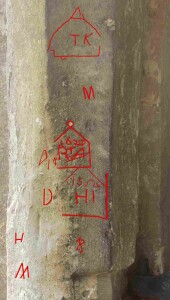
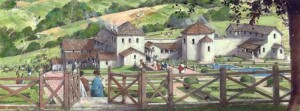
 have Keith Westcott talking about his recent discovery of the extensive Roman villa on the Broughton Castle estate. As a keen metal detectorist he considered the landscape context and previous local discoveries and set about systematically investigating his hunch that there was some significant Roman activity in the area. His persistence was rewarded, and since his discovery he has been working with evangelical zeal to consolidate his findings. and to integrate the amateur, specialist and professional interests he has generated in researching the site.
have Keith Westcott talking about his recent discovery of the extensive Roman villa on the Broughton Castle estate. As a keen metal detectorist he considered the landscape context and previous local discoveries and set about systematically investigating his hunch that there was some significant Roman activity in the area. His persistence was rewarded, and since his discovery he has been working with evangelical zeal to consolidate his findings. and to integrate the amateur, specialist and professional interests he has generated in researching the site. 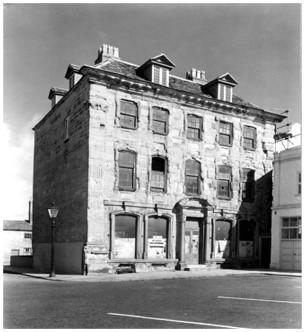 worsted spinning mill in England at the time, employing 500 workers, and it was the first factory in Warwickshire to bring all the elements for producing worsted yarn into one place – “vertical integration”. The factory system was a blow to the cottage industries and was not welcomed by all, although the frame breaking by Luddites experienced elsewhere did not affect Warwick. The Warwick factory’s efficiency enabled it to supply Leicester and Hinkley hosiery manufacturers and Kidderminster carpet factories. It benefitted from the innovations of the industrial revolution taking place in the west midlands, with a Bolton and Watt steam engine and a patented “Smoke Consumer” to meet the requirements of the 1821 Steam Furnaces Act, an early anti-pollution measure. The factory contributed to Warwick’s prosperity and growth in the early 19th century, although the living condition of the workers was appalling, with the factory district a notorious slum of “pauper squares”. The decline of the business came about through a combination of personality clashes between the partners’ heirs, the economic decline following the end of the Napoleonic wars and stiff competition as other centres with better resources caught up with Warwick. Our thanks to Tim Clark for his stimulating talk, and for agreeing to be our first semi-virtual speaker, and thanks also to our membership.
worsted spinning mill in England at the time, employing 500 workers, and it was the first factory in Warwickshire to bring all the elements for producing worsted yarn into one place – “vertical integration”. The factory system was a blow to the cottage industries and was not welcomed by all, although the frame breaking by Luddites experienced elsewhere did not affect Warwick. The Warwick factory’s efficiency enabled it to supply Leicester and Hinkley hosiery manufacturers and Kidderminster carpet factories. It benefitted from the innovations of the industrial revolution taking place in the west midlands, with a Bolton and Watt steam engine and a patented “Smoke Consumer” to meet the requirements of the 1821 Steam Furnaces Act, an early anti-pollution measure. The factory contributed to Warwick’s prosperity and growth in the early 19th century, although the living condition of the workers was appalling, with the factory district a notorious slum of “pauper squares”. The decline of the business came about through a combination of personality clashes between the partners’ heirs, the economic decline following the end of the Napoleonic wars and stiff competition as other centres with better resources caught up with Warwick. Our thanks to Tim Clark for his stimulating talk, and for agreeing to be our first semi-virtual speaker, and thanks also to our membership.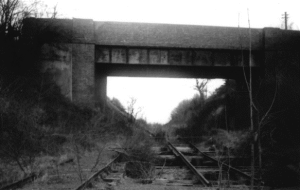 Our February 21st meeting features an illustrated talk by Andrew Baxter, a speaker familiar to us from his stimulating talk last year on the Edgehill Tea Gardens. Andrew will describe the recent work that he and other enthusiasts have been carrying out on the surviving vestiges of the Edgehill Light Railway. This short-lived enterprise left clear landscape features and some surviving artefacts but has otherwise disappeared from most people’s awareness. We will learn what the light railway project if completed would have meant to the landscape of the area.
Our February 21st meeting features an illustrated talk by Andrew Baxter, a speaker familiar to us from his stimulating talk last year on the Edgehill Tea Gardens. Andrew will describe the recent work that he and other enthusiasts have been carrying out on the surviving vestiges of the Edgehill Light Railway. This short-lived enterprise left clear landscape features and some surviving artefacts but has otherwise disappeared from most people’s awareness. We will learn what the light railway project if completed would have meant to the landscape of the area. 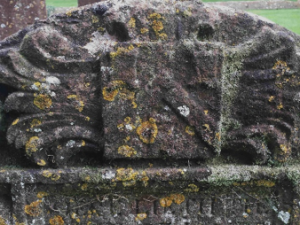 Report on our first meeting in the New Year. For our first 2020 meeting David Freke gave an account of the art of 18th century local village stone masons. In fact David started way back in the 17th century to set the scene for the sometimes extremely accomplished 18th century work still visible in so many of our local churchyards. The very style of headstones can illuminate the religious controversies of the period, as well as the status of the patron and the skill (or lack of it) of the mason. The influence of outside events also played a part, with local craftsmen attracted to London in the wake of the Great Fire, and returning with up-to-date ideas and training. A few proudly displayed the arms of the Worshipful Company of Masons of London on their own headstones. Their work is visible to anybody to see in our local churchyards, and it is hoped that better knowledge will lead to better appreciation and better protection of what still survives after 300 years or so of English weather, and well intentioned but often destructive churchyard tidying episodes. Our President Bob Bearman led the vote of thanks, and the membership then adjourned for refreshments presided over by Ilona.
Report on our first meeting in the New Year. For our first 2020 meeting David Freke gave an account of the art of 18th century local village stone masons. In fact David started way back in the 17th century to set the scene for the sometimes extremely accomplished 18th century work still visible in so many of our local churchyards. The very style of headstones can illuminate the religious controversies of the period, as well as the status of the patron and the skill (or lack of it) of the mason. The influence of outside events also played a part, with local craftsmen attracted to London in the wake of the Great Fire, and returning with up-to-date ideas and training. A few proudly displayed the arms of the Worshipful Company of Masons of London on their own headstones. Their work is visible to anybody to see in our local churchyards, and it is hoped that better knowledge will lead to better appreciation and better protection of what still survives after 300 years or so of English weather, and well intentioned but often destructive churchyard tidying episodes. Our President Bob Bearman led the vote of thanks, and the membership then adjourned for refreshments presided over by Ilona.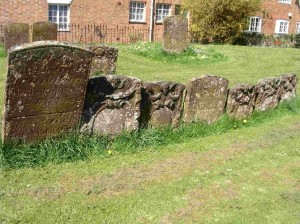 For our first 2020 meeting David Freke will give an illustrated talk entitled Elegy on Country Churchyards: the art of 18th century local village stone masons. The Group’s survey of St Peter’s churchyard, initiated by Peter and Gill Ashley-Smith in 2010, was the start of this study. It has led to investigations into local genealogy, geology, politics, religion and art history. The thread which binds these elements together has been the search for the many men (always men) who made the thousands of 17th and 18th century memorials which still survive in our local churchyards. These memorials constitute the largest body of vernacular art of the period, far outnumbering folk art objects in galleries, and much more accessible. As Gray’s Elegy might have put it: “Some mute inglorious Mason here may rest” and the hope is that some may not be so mute nor so inglorious when their work is better appreciated.
For our first 2020 meeting David Freke will give an illustrated talk entitled Elegy on Country Churchyards: the art of 18th century local village stone masons. The Group’s survey of St Peter’s churchyard, initiated by Peter and Gill Ashley-Smith in 2010, was the start of this study. It has led to investigations into local genealogy, geology, politics, religion and art history. The thread which binds these elements together has been the search for the many men (always men) who made the thousands of 17th and 18th century memorials which still survive in our local churchyards. These memorials constitute the largest body of vernacular art of the period, far outnumbering folk art objects in galleries, and much more accessible. As Gray’s Elegy might have put it: “Some mute inglorious Mason here may rest” and the hope is that some may not be so mute nor so inglorious when their work is better appreciated.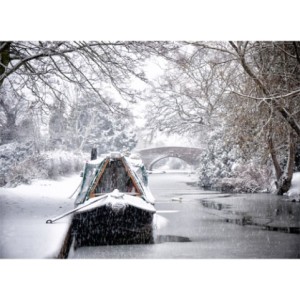
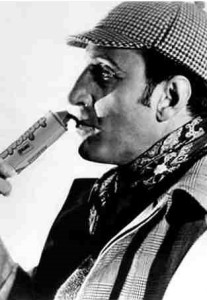 Which is more than can be said for the final part of the meeting. Tripping over the clutter of mikes, cables and props, Kineton’s Other Dramatic Society aka the committee – aided by Jane Waters in an original Victorian dress (the most authentic element of the whole sorry saga) – the committee stumbled through a doggerel script purporting to be a Victorian who-dun-it, with dreadful puns and mangled syntax. It was farrago of nonsense about a lost gavel, involving mispronounced place-names, a thinly disguised parody of Conan Doyle’s famous detective addicted to sherbet, with some inappropriate violin abuse, all fed through a Dickensian mincer to emerge as a tale, full of sound and fury, and signifying nothing. Congratulations to all involved for the sheer nerve of it, and to the membership for refraining from catcalls and brickbats. Afterwards, with much relief, to quote a line from the performance, the membership fell on the traditional mince pies, provided by the committee, and the mulled wine prepared by Ilona, served by Mark and Jackie Walker.
Which is more than can be said for the final part of the meeting. Tripping over the clutter of mikes, cables and props, Kineton’s Other Dramatic Society aka the committee – aided by Jane Waters in an original Victorian dress (the most authentic element of the whole sorry saga) – the committee stumbled through a doggerel script purporting to be a Victorian who-dun-it, with dreadful puns and mangled syntax. It was farrago of nonsense about a lost gavel, involving mispronounced place-names, a thinly disguised parody of Conan Doyle’s famous detective addicted to sherbet, with some inappropriate violin abuse, all fed through a Dickensian mincer to emerge as a tale, full of sound and fury, and signifying nothing. Congratulations to all involved for the sheer nerve of it, and to the membership for refraining from catcalls and brickbats. Afterwards, with much relief, to quote a line from the performance, the membership fell on the traditional mince pies, provided by the committee, and the mulled wine prepared by Ilona, served by Mark and Jackie Walker. particular her recordings of people who lived in Birmingham’s “back-to-backs”. She vividly demonstrated the importance of capturing the experiences of “ordinary” people, which might otherwise go unrecorded and unappreciated. Her examples included children and even a titled lady describing the English upper-class dinner ritual of not so long ago. A query from Gill about whether she would edit words or phrases which are now considered inappropriate (she wouldn’t) led on to a discussion about the possibility of bias in the record in favour of politically correct attitudes. Helen described a deliberate attempt to redress this perceived imbalance by seeking out a racist to record, with mixed results. Her point was that the recordings are valuable because they try to reflect the way people actually think, and sound. Another issue was the long-term security of the recordings, given the rapid changes we have seen in sound recording technology. There is the risk of historic recordings being lost either through deterioration of the medium or as the equipment to play them becomes obsolete. Our own oral history recordings are indeed on out-dated mini-discs. Helen conceded that in the future video clips might have a greater role, given their current ubiquity. Ilona led the vote of thanks for a stimulating and entertaining evening.
particular her recordings of people who lived in Birmingham’s “back-to-backs”. She vividly demonstrated the importance of capturing the experiences of “ordinary” people, which might otherwise go unrecorded and unappreciated. Her examples included children and even a titled lady describing the English upper-class dinner ritual of not so long ago. A query from Gill about whether she would edit words or phrases which are now considered inappropriate (she wouldn’t) led on to a discussion about the possibility of bias in the record in favour of politically correct attitudes. Helen described a deliberate attempt to redress this perceived imbalance by seeking out a racist to record, with mixed results. Her point was that the recordings are valuable because they try to reflect the way people actually think, and sound. Another issue was the long-term security of the recordings, given the rapid changes we have seen in sound recording technology. There is the risk of historic recordings being lost either through deterioration of the medium or as the equipment to play them becomes obsolete. Our own oral history recordings are indeed on out-dated mini-discs. Helen conceded that in the future video clips might have a greater role, given their current ubiquity. Ilona led the vote of thanks for a stimulating and entertaining evening.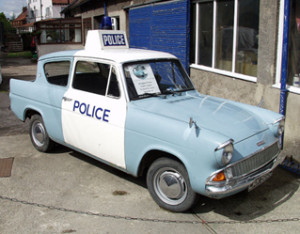 On the beat he seems to have found ways to liven up boring night shifts. One device was to play cat-and-mouse around Redditch with a fellow panda car patrol, in the course of which, on one occasion, he chased and apprehended a pair of safe crackers by accident, thinking that their car was his fellow officer’s. He felt his subsequent commendation was possibly unearned. On another occasion he drew his truncheon and bravely confronted a sinister noise coming from a narrow, darkened passage, only to discover a cat. We did learn the Correct Use of the Truncheon however.
On the beat he seems to have found ways to liven up boring night shifts. One device was to play cat-and-mouse around Redditch with a fellow panda car patrol, in the course of which, on one occasion, he chased and apprehended a pair of safe crackers by accident, thinking that their car was his fellow officer’s. He felt his subsequent commendation was possibly unearned. On another occasion he drew his truncheon and bravely confronted a sinister noise coming from a narrow, darkened passage, only to discover a cat. We did learn the Correct Use of the Truncheon however.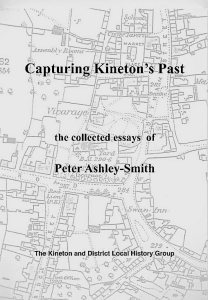
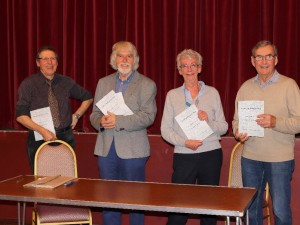
 Peter’s local history essays, edited by our President Robert Bearman, have now been printed and members and friends are invited to the launch on October 4th at 7.30 in the Village Hall.
Peter’s local history essays, edited by our President Robert Bearman, have now been printed and members and friends are invited to the launch on October 4th at 7.30 in the Village Hall.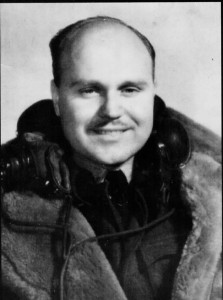 Our first evening talk after the summer break is on Friday 20th September entitled Shadows of the Past: WWII, to be given by Paul and Terry Gaunt, cousins of our Vice-Chairman Roger Gaunt, about the exploits of Roger’s uncle, Phillip “Tubby” Gaunt, as a WWII bomber pilot. Paul Gaunt has written a book about his father’s career, from training to a crash landing in Croatia. You will have to come on Friday to hear the end of that story …..
Our first evening talk after the summer break is on Friday 20th September entitled Shadows of the Past: WWII, to be given by Paul and Terry Gaunt, cousins of our Vice-Chairman Roger Gaunt, about the exploits of Roger’s uncle, Phillip “Tubby” Gaunt, as a WWII bomber pilot. Paul Gaunt has written a book about his father’s career, from training to a crash landing in Croatia. You will have to come on Friday to hear the end of that story …..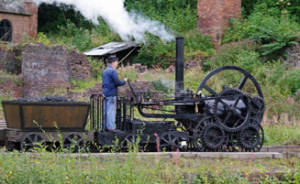 We were looking forward to visiting this World Heritage Site, a cradle of the industrial revolution, which includes Blists Hill Victorian Town, the iconic bridge itself and other historic industrial sites in Ironbridge Gorge, and it did not disappoint. The drizzle which greeted us at Blists Hill quickly evaporated, helped by a quick coffee and visits to the Bank, the grocers, the carpenters shop, the haberdashers (under 40s won’t know what that is!) and other nostalgic delights (eg fish and chips). A highlight for some was the steam locomotive, constructed to Trevithick’s 1802 designs by GKN Sankey apprentices in 1989, puffing up and down its short track, proving its practicality decades before Stephenson’s “Rocket”.
We were looking forward to visiting this World Heritage Site, a cradle of the industrial revolution, which includes Blists Hill Victorian Town, the iconic bridge itself and other historic industrial sites in Ironbridge Gorge, and it did not disappoint. The drizzle which greeted us at Blists Hill quickly evaporated, helped by a quick coffee and visits to the Bank, the grocers, the carpenters shop, the haberdashers (under 40s won’t know what that is!) and other nostalgic delights (eg fish and chips). A highlight for some was the steam locomotive, constructed to Trevithick’s 1802 designs by GKN Sankey apprentices in 1989, puffing up and down its short track, proving its practicality decades before Stephenson’s “Rocket”.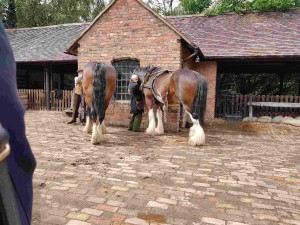 The shire horses also demonstrated that heavy haulage was still mainly horse powered. The extent of the 18th and 19th century enterprise here was clear from the ruins of the blast furnaces at the bottom of the town, and the sundry bits of iron machinery set up on the roadside, together with pigs and chickens to show that there was a domestic dimension to all this industry.
The shire horses also demonstrated that heavy haulage was still mainly horse powered. The extent of the 18th and 19th century enterprise here was clear from the ruins of the blast furnaces at the bottom of the town, and the sundry bits of iron machinery set up on the roadside, together with pigs and chickens to show that there was a domestic dimension to all this industry.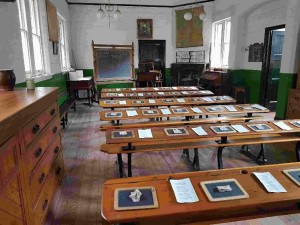 reminded a few of us of their own school days, although we had inkwells not slates. Various craftworkers demonstrated their skills such as woodcarving, and bread making. We moved on to see the iconic bridge, surprisingly high above the Severn, and now in a settlement whose existence is entirely due to its presence.
reminded a few of us of their own school days, although we had inkwells not slates. Various craftworkers demonstrated their skills such as woodcarving, and bread making. We moved on to see the iconic bridge, surprisingly high above the Severn, and now in a settlement whose existence is entirely due to its presence.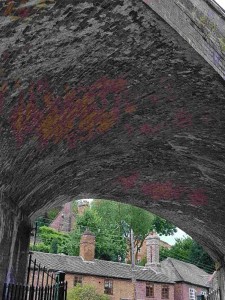 Ice cream was needed before our third and final stop at the Coalbrookdale Museum of Iron, re-opened in 2017, full of new exhibits explaining the development of ironworking and the history of the Coalbrookdale industrial complex. It is approached through an example of the wonderful brickwork achieved by Victorian engineers and builders – one of a series of skewed brick arches supporting a railway viaduct – although it proves an awkward access for today’s coaches. The museum’s objects and displays chart the increasing sophistication of ironworking technology, which was not always matched by a correspondingly sophisticated taste.
Ice cream was needed before our third and final stop at the Coalbrookdale Museum of Iron, re-opened in 2017, full of new exhibits explaining the development of ironworking and the history of the Coalbrookdale industrial complex. It is approached through an example of the wonderful brickwork achieved by Victorian engineers and builders – one of a series of skewed brick arches supporting a railway viaduct – although it proves an awkward access for today’s coaches. The museum’s objects and displays chart the increasing sophistication of ironworking technology, which was not always matched by a correspondingly sophisticated taste.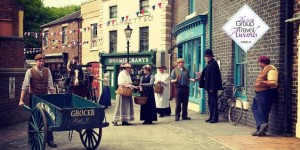
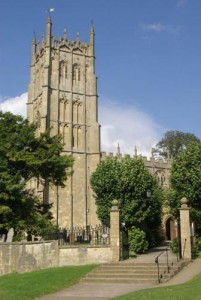 of “campa denu” – valley with cultivated fields – which had become a village by the time of the Domesday survey. The “chipping” – market – was added by Hugh de Gondeville in 1185, who also laid out the plan of the new town with regular burgage plots running back from the wide market street, still clearly visible in the town’s plan.
of “campa denu” – valley with cultivated fields – which had become a village by the time of the Domesday survey. The “chipping” – market – was added by Hugh de Gondeville in 1185, who also laid out the plan of the new town with regular burgage plots running back from the wide market street, still clearly visible in the town’s plan.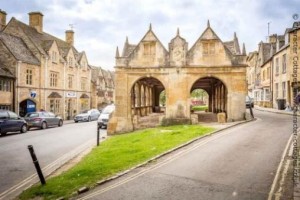
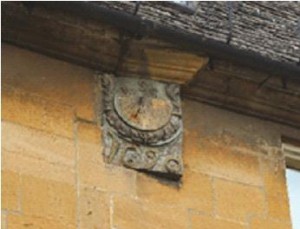 that survives are the banqueting houses and stables. The later 17th century was a period of construction, as evidenced by the many date stones proudly displayed on buildings, either newly built or added to in this period.
that survives are the banqueting houses and stables. The later 17th century was a period of construction, as evidenced by the many date stones proudly displayed on buildings, either newly built or added to in this period. 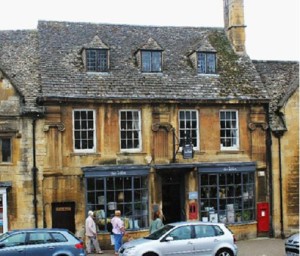 The town’s later decline was arrested in the early 20th century by the revival of the arts and craft traditions, specifically CR Ashbee’s decision to move the Guild of Handicraft to Campden in 1902. The silversmithing operation set up by the Guild is still run by David Hart,
The town’s later decline was arrested in the early 20th century by the revival of the arts and craft traditions, specifically CR Ashbee’s decision to move the Guild of Handicraft to Campden in 1902. The silversmithing operation set up by the Guild is still run by David Hart, 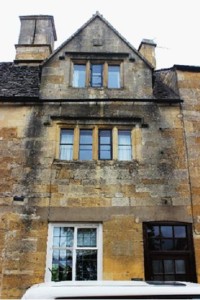 the grandson of George Hart who joined Ashbee 1901. The workshop in Sheep Street is fascinating, with the traditional tools around the walls and on benches, and bunches of old invoices hanging from the ceiling like wasps nests (also made of paper!)
the grandson of George Hart who joined Ashbee 1901. The workshop in Sheep Street is fascinating, with the traditional tools around the walls and on benches, and bunches of old invoices hanging from the ceiling like wasps nests (also made of paper!)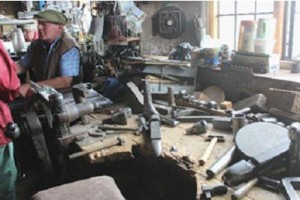 Our route
Our route